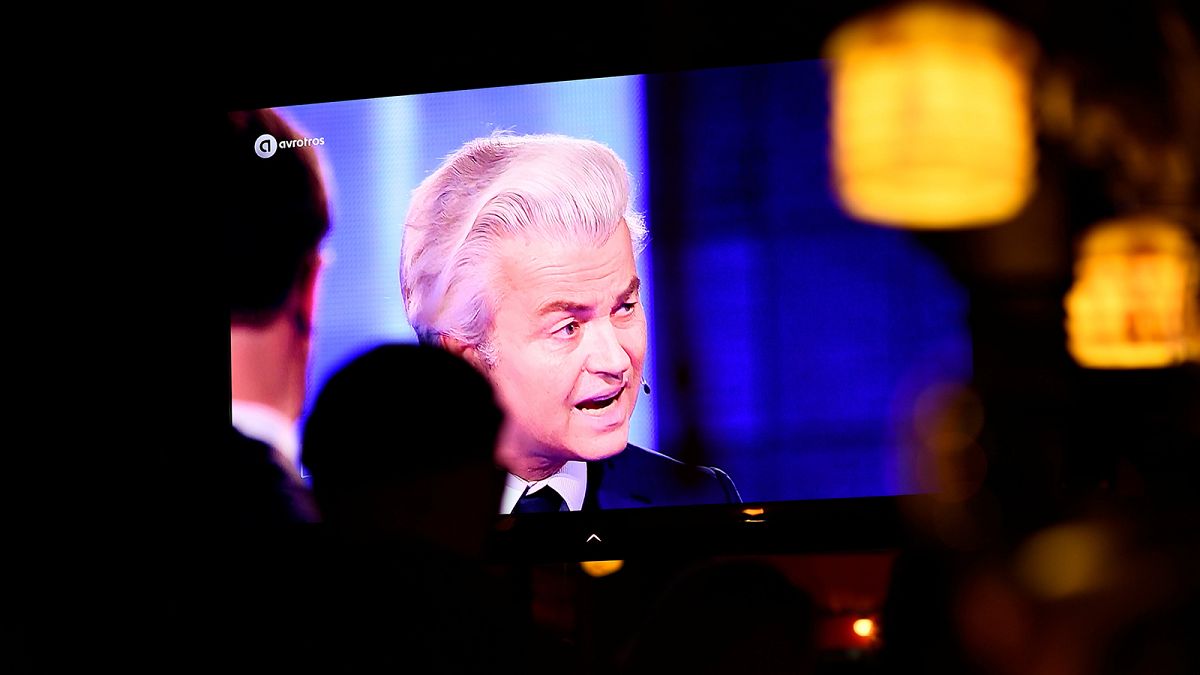A right-wing revolt is underway in the most unlikely of places – the Netherlands.
A right-wing revolt is underway in the most unlikely of places – the Netherlands.
It was the first worldwide to legalise both euthanasia and gay marriage. And the country is known for its relaxed drug laws.
Amsterdam, has a long history of offering a safe haven to those fleeing their homelands. From Jews escaping persecution in Spain to the Syrian refugees of today.
The Netherlands, widely seen as one of the most tolerant nations in Europe, is changing. Perhaps for good?
The Wilders effect
It is down, in part, to one of the longest-serving Dutch MPs Geert Wilders wants to ban the Koran, stop Muslim immigration and refers to Moroccans as “scum.” He lives under permanent police protection.
His Party for Freedom topped polls for most of the campaign ahead of Wednesday’s election. In the Netherlands, a country of coalition government, no single party has ever won an absolute majority. Most of his rivals rule out working with this firebrand politician.
Euronews’ James Franey reported: “Geert Wilders has in many ways followed in the footsteps of Pim Fortuyn, who rose to prominence in the Netherlands after 9/11. Socially liberal, but a critic of immigration and Islam, this openly gay politician dared to speak up on issues that were considered taboo at the time. His party topped the polls ahead of the 2002 general election.”
He continued: “But he was shot dead after leaving a radio interview nine days before the vote. And two years later, director Theo Van Gogh was killed by a radical Islamist over a film he made that was critical of Islam. Freedom of speech cost both men their lives. It’s left this country wondering more than a decade later what it means to be Dutch.”
A survey last month found many worry about the erosion of traditional values, eighty six percent of those people interviewed. Wilders taps into that sense of a lost identity by railing against immigration, globalisation and the European Union.
We are ‘too tolerant’
In a small town outside Utrecht, we meet with one of his supporters.
“We are too tolerant. I’m openly gay, in the past I’ve known a lot of violence. Weekly I’ve been harassed. Insults, intimidation, threats, just because I’m gay,” said Patrick.
“I’ve been beaten up, eleven or twelve youngsters from Morocco, Turkey and Somalia have beaten me up at a parking lot. I’ve done a declaration, two testimonies (but without results).”
There are roughly one million Muslims in the Netherlands, a nation of seventeen million. The majority are Dutch citizens of Moroccan or Turkish origin. The children of the workers who arrived during the post-war economic boom.
Wilders’ critics
In the north of Amsterdam, there’s not much love for Wilders’ anti-immigrant rhetoric.
“The Turkish people, they don’t like him. But not only Turkish people.. Spanish, Moroccan, and a lot of (others),” a bakery worker told us.
“And they are coming here and if I said ‘Wilders,’ they want to kill the man because he says too much f****d up things about Islam and not just Islam.”
An elderly Moroccan man added: “Not all Muslims are bad people. He (Wilders) hates Muslims – I’ve no idea why – but I don’t hate Geert Wilders.”
Religion and politics
The post-war wave of migration coincided with Dutch people staying away from church. Just 10 percent go every week. In the sixties, half of all Dutch people attended a weekly service
Experts say that religion – or now, rather the lack of it – has a big impact country’s political makeup. This has created a space for the Party for Freedom, also known by its Dutch acronym – the PVV
Matthijs Rooduijn, Professor of Sociology at the University of Utrecht, explained: “It’s not possible to understand the rise of this party without the idea of individualisation. Dutch society was really a ‘pillarised’ society in the past, which means that there are social political groups and people usually voted for the party that belonged to their group. In the past, of course, religion was pretty important.
“We have Protestants and Catholics. A divided north and south, basically. And religion was also very important when it comes to politics. Your religion to some extent therefore also had a huge impact on which party you voted for. So people really start to switch between parties and one of the parties they might vote for is the PVV.”
‘Too much at stake for us to be divided’
Geert Wilders probably won’t be in the next government unless he is willing to compromise. But his impact is undeniable. In January, Prime Minister Mark Rutte’ told immigrants who don’t want to respect Dutch values to leave the country.
One candidate, standing on an anti-racism platform, has a word of warning.
“First, it is this one group of people. But what do we do after we eliminate that one group of people? Who is going to be next?” asks Slyvana Simons, Founder of Artikel 1.
“Could be women. Could be gays. Could be black people. Could be anybody that you have in your life that you love. There’s too much at stake for us to be divided.”
